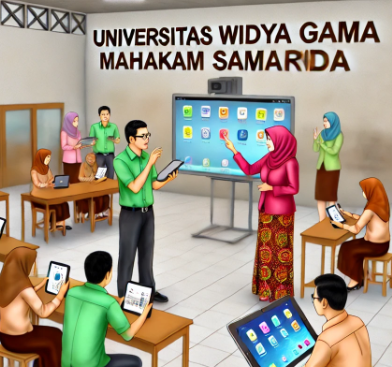Examining Technology Integration in Micro Teaching: Unique Insights from Pre-Service Teachers at Universitas Widya Gama Mahakam Samarinda Using the Harris, Grandgenett, and Hofer Framework
DOI:
https://doi.org/10.24903/bej.v6i2.1706Keywords:
technology integration, microteaching, pre service studentsAbstract
The objective of the study was to know the categories of Harris J., Grandgenett, N., and Hofer M toward preservice teachers in Micro Teaching Course at Widya Gama Mahakam Samarinda University. This study was conducted at fifth semester of English Education Department, University of Widya Gama Mahakam Samarinda. This study focused on technology integration of pre service teachers that implemented in micro teaching course. Design of this study was qualitative study. There were 24 pre-service teachers in this study determined by purposive sampling. The instrument used was interview guide by Harris J., Grandgenett, N., and Hofer M. There were 5 pre-service teachers who were willing to be the interviewees. Then, the researcher collected the data by simulated recall interview and video as the source of data. The result of the study showed pre service teachers were good enough in implementing technology integration in their micro teaching course. There were four categories seemed in this study. They were about curriculum goals, instructional strategy, technology selection, and fit. Researchers conclude that all the categories were fit together in a harmony although some of preservice teachers still using low technology in their practice
References
Baxter, P. & Jack , S. (2008). Qualitative Case Study Methodology: Study Design and Implementation for Novice Researchers. The Qualitative Report, 13 (4)
Billen, Kadir. (2015). Effect of micro teaching technique on teacher candidates’ beliefs regarding mathematics teaching. Akdeniz University, Alanya Faculty of Education, Department of Elementary Education, Alanya, Antalya, Turkey
Chien, Y.-T., Chang, C.-Y., Yeh, T.-K., & Chang, K.-E. (2012). Engaging Pre-service Science Teachers to Act as Active Designers of Technology Integration: A MAGDAIRE Framework. Teaching and Teacher Education, 28, 578-588. doi: 10.106/j.tate.2011.12.005
Fraenkel, J. R., Wallen, N. E., & Hyun, H. H. (2012). How to Design and Evaluate Research in Education. New York: McGraw-Hill.
Gay, L. R., Mills, G. E., & Airasian, P. W. (2011). Educational Research: Competencies for Analysis and Applications (10 ed.). United States: Pearson Education, Inc.
Harris, J., Koehler, M., Koehler, M. J., & Mishra, P. (2009). What Is Technological Pedagogical Content Knowledge? Contemporary Issues in Technology and Teacher Education. https://doi.org/10.1016/j.compedu.2010.07.009
Harvey, Doglas. M., Caro, Ronald. (2016). Building TPACK in Preservice Teachers Through Explicit Course Design. Association for Educational Communication & Technology. DOI 10.1007/s11528-016-0120-x
Kartal, Tezcan., Ozturk, Nurhan., Ekici, Gulay. (2012). Developing pedagogical content knowledge in preservice science teachers through microteaching lesson study: Ankara, Turkey.
Kurt G., Akyel A., Kocoglu Z., Mishra. TPACK in practice: A qualitative study on technology integrated lesson planning and implementation of Turkish pre-service teachers of English. International Association of Research in Foreign Language Education and Applied Linguistics ELT Research Journal 2014, 3(3), 153-166
Koehler M, Mishra P (2008) Introducing TPCK. In: AACTE Committee on Innovation and Technology (ed) Handbook of technological pedagogical content knowledge (TPCK) for educators. Routledge, New York, pp 3–31
Limbong, Effendi. (2016). Designing and Developing Supplemental Technology of PACI Model Materials through Blended Learning Methods. A Journal of Culture, English Language, teaching, and Literature: Soegijapranata Catholic University, Indonesia.
Miles, M. B., & Huberman, A. M. (1994). Qualitative Data Analysis 2nd ed. United States of America: SAGE publications.
Mishra, P., Koehler, M.J., Bragg, W.H. (2006). Technological Pedagogical Content Knowledge: A Framework for Teacher Knowledge the Advent of Digital Technology has Dramatically Changed routines and practice in most arenas of human work. Advocates of Technology in education often envisage similar dra. Teacher College Record, 108(6), 1017-1054.
Mishra P, Koehler MJ (2007) Technological pedagogical content knowledge (TPCK): confronting the wicked problems of teaching with technology. In: Carlsen R et al (eds) Proceedings of society for information technology and teacher education international conference 2007. AACE, Chesapeake, pp 2214–2226

Downloads
Published
How to Cite
Issue
Section
License
Copyright (c) 2024 Sukaena, Effendi Limbong, Desy Rusmawaty

This work is licensed under a Creative Commons Attribution 4.0 International License.
Authors retain copyright and grant the journal right of first publication with the work simultaneously licensed under a Creative Commons Attribution 4.0 International License that allows others to share the work with an acknowledgment of the work's authorship and initial publication in this journal.



